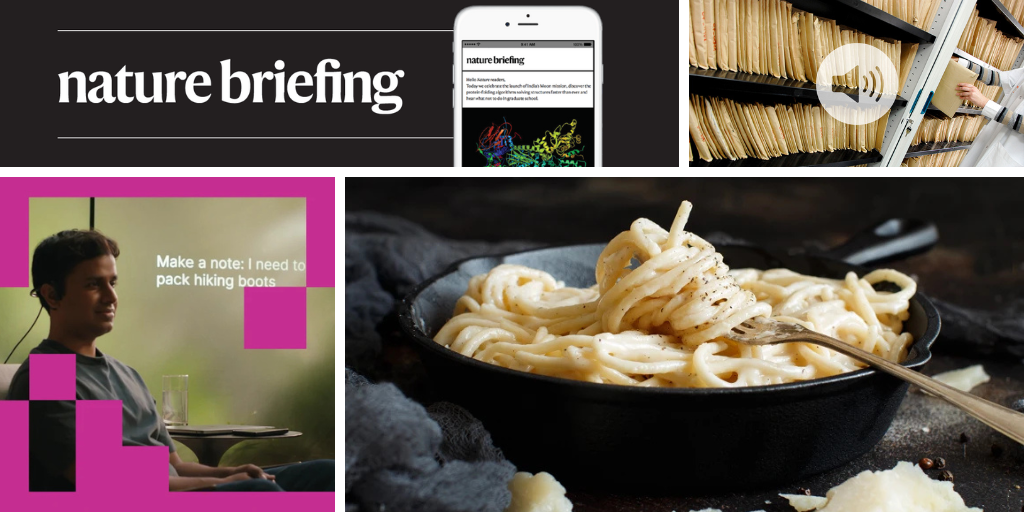You have full access to this article via your institution.
Hello Nature readers, would you like to get this Briefing in your inbox free every day? Sign up here.

Arnav Kapur, chief executive of AlterEgo, demonstrates the wearable device.Credit: AlterEgo
A wearable device offers a similar experience to brain-computer interfaces without the invasive implants or the privacy concerns that come along with mind-reading. The ‘AlterEgo’ device detects electrical signals in the muscles used to formulate speech that are sent by the brain when you silently mouth or even just internally articulate words. Its makers say it could be used by people who have issues with speaking, or to interact with voice-controlled applications without having to talk out loud.
Regular readers of this newsletter will remember when an all-Italian team of researchers set out to ‘scientifically optimize’ the recipe for cacio e pepe. (Their solution involved adding only one ingredient to the traditional combination of pasta, black pepper and pecorino cheese: cornstarch.) Now the team can add an Ig Nobel Prize to their mantle next to their ‘mentioned in the Nature Briefing’ trophy. “We were thrilled and genuinely honored,” says psychologist Fritz Renner, who co-authored another winning study, on how a little tipple can improve your foreign-language skills.
Reference: Physics of Fluids paper & Journal of Psychopharmacology paper
Features & opinion
Octopuses are a fascinating combination of intelligence and otherworldliness that can tempt us to turn to them for insights into ourselves, writes author Verlyn Klinkenborg in his review of five recent books on the eight-armed muse. “If you’ve ever met one in the wild, you know that an octopus doesn’t just look at you. It considers you,” writes Klinkenborg. “To encounter an octopus is to be implicated in a question about being that engulfs you both.”
The New York Review of Books | 18 min read
A man considers whether ignorance is, in fact, bliss in the latest short story for Nature’s Futures series.
Andrew Robinson’s pick of the top five science books to read this week includes a scandalous study of symbiosis and the lives of ‘experimental archaeologists’ that recreate the ways of the lost civilizations.
A new AI tool, called Delphi-2M, can calculate a person’s risk of developing different diseases, sometimes years in advance. The model was trained to identify patterns of disease progression using the health records of 400,000 people, which allows the tool to predict someone’s future disease risks, based on their current medical record. The typical set up for AI health-prediction systems is “one tool for one disease”, says AI researcher and study co-author Moritz Gerstung. “There is not really a tool that does provide a very comprehensive assessment.” Delphi-2M could fill that gap — it can calculate the risk of over 1,000 diseases at once.
Nature Podcast | 35 min listen
Subscribe to the Nature Podcast on Apple Podcasts, Spotify or YouTube Music, or use the RSS feed.
Today Leif Penguinson is hiding on the shores of the world’s highest freshwater lake system — the Gokyo Lakes in Nepal. Can you find the penguin?
The answer will be in Monday’s e-mail, all thanks to Briefing photo editor and penguin wrangler Tom Houghton.
This newsletter is always evolving — tell us what you think! Please send your feedback to [email protected].
Thanks for reading,
Flora Graham, senior editor, Nature Briefing
With contributions by Jacob Smith
• Nature Briefing: Careers — insights, advice and award-winning journalism to help you optimize your working life
• Nature Briefing: Microbiology — the most abundant living entities on our planet — microorganisms — and the role they play in health, the environment and food systems
• Nature Briefing: Anthropocene — climate change, biodiversity, sustainability and geoengineering
• Nature Briefing: AI & Robotics — 100% written by humans, of course
• Nature Briefing: Cancer — a weekly newsletter written with cancer researchers in mind
• Nature Briefing: Translational Research — covers biotechnology, drug discovery and pharma


